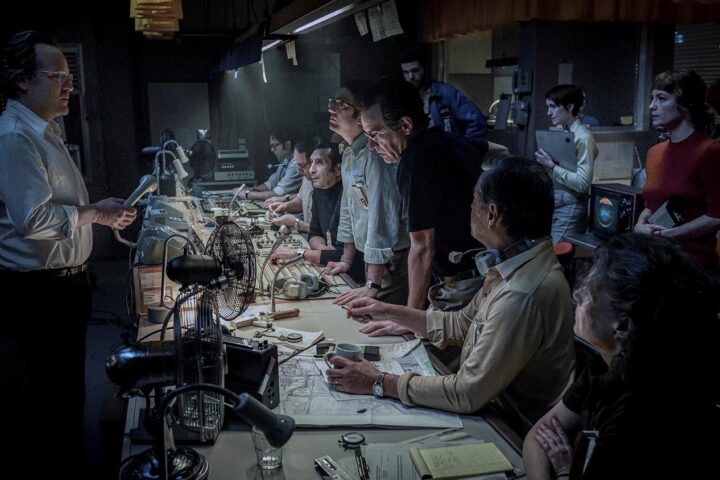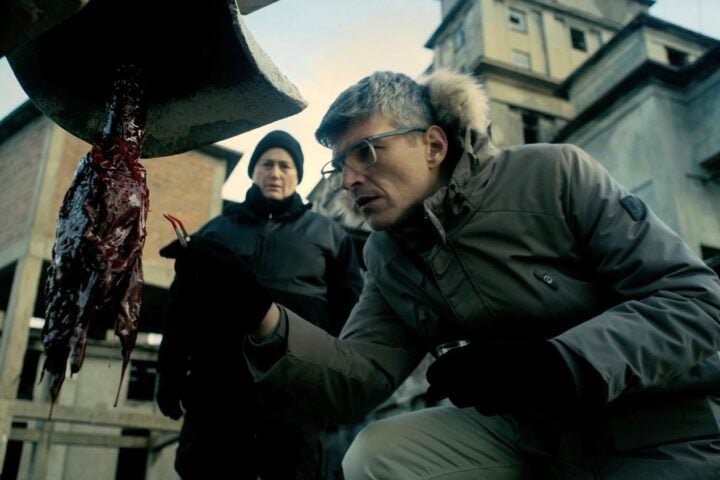For a film that opens with a sepia-toned newsreel montage aimed at situating its plot at a precise historical moment, and includes Upton Sinclair (Fisher Stevens) among its cast of characters, Joseph Schuman and Austin Stark’s Coup! feels strangely dislocated from time. Given that the setting is an island off the mid-Atlantic coast during the Spanish Flu epidemic of 1918, this comes off as intentional, if only to a degree. In isolation, as anyone who experienced a Covid lockdown knows, time becomes a strange beast indeed. When we’re cut adrift from the routines of work and social obligation, our sense of historical continuity begins to wink out like a dying fluorescent bulb, and the film’s characters experience the same phenomenon.
Coup! follows an enigmatic rogue, Floyd Monk (Peter Sarsgaard), who passes himself off as a cook in order to gain employment at an island estate a boat ride from New York City. Progressive muckraker Jay Horton (Billy Magnussen) owns the manse and its grounds, where he isolates in secret with his wife, Julie (Sarah Gadon), and their two children. In relative safety, Jay rattles off article after article demanding business closures to protect workers or slamming the Wilson administration for censoring news about the epidemic.
Even as Jay expresses his affinity for “the working man” in fiery rhetoric, he lives surrounded by luxury, and treats his servants with self-righteous paternalism. Floyd works quickly to turn not only his fellow staff but Jay’s family against him, codeswitching between the world-wise yet deferent retainer, the freewheeling bohemian, the salt-of-the-earth revolutionary, and the bandit king, depending on who he’s trying to manipulate at any given time.
Schuman and Stark’s film so consciously plays up what would seem to be the obvious parallels between 1918 and 2020 that the historical paraphernalia of this costume drama makes it seem like an interwar-themed costume party, and yet Coup! isn’t just a gussied-up commentary on 2020. Neither does the film treat its historical era with the belligerent flippancy of, say, Yorgos Lanthimos’s The Favourite, which systematically blocks its audience from accepting that the events it depicts could plausibly have happened at a specific point in time.
It may be that the setting of Coup! is little more than a noncommittal resignation to the current fad for historical fiction, as the film has little to add on the subject of the interplay of politics and infectious disease, then or now. If so, there’s a certain irony to the fact that what it does weigh in on is the base expediency of mano-a-mano power struggle. The filmmakers have a much more cynical idea of class politics than the film’s tonal goofiness would suggest—though this may be down to the underdevelopment of the supporting characters. Floyd’s “insurrection” is as much a matter of petty opportunism as Jay’s progressive posturing. More than anything, theirs is a tussle between self-aggrandizing individuals, each claiming to speak for the downtrodden.
Oscillating between the charismatic and the sinister, Sarsgaard keeps us guessing whether Floyd is more a scalawag or a calculating demagogue. Meanwhile, Magnussen leans so hard into Jay’s insecurity that the man, despite his flagrant deceptions, becomes almost sympathetic. The film’s insistence on the clash of personalities offers a typically bourgeois notion of history, which frames the Russian Revolution, for one, as a product of a personal rivalry between Lenin and the Romanovs, as opposed to a tectonic jolt between social and economic forces.
Or it may be that what Coup! aims to confront us with is the vertigo of those moments of instability—thick and fast, these days—when the bedtime story of history-as-inexorable-progress falters and sheds its persuasiveness, leaving us at the mercy of any hypocrite with a robust enough will to power, irrespective of which rung in the social hierarchy they happen to occupy. Accordingly, one would expect either a much blacker comedy or graver tone than that cheeky exclamation mark in the title so accurately portends, for despite its subject matter, Coup! comes across as light entertainment: class war for as long as the popcorn lasts.
Since 2001, we've brought you uncompromising, candid takes on the world of film, music, television, video games, theater, and more. Independently owned and operated publications like Slant have been hit hard in recent years, but we’re committed to keeping our content free and accessible—meaning no paywalls or fees.
If you like what we do, please consider subscribing to our Patreon or making a donation.






